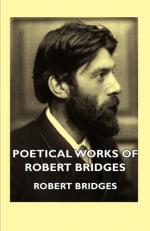|
This section contains 1,414 words (approx. 5 pages at 300 words per page) |

|
SOURCE: “Victorian Afterglow,” in his The Concept of Nature in Nineteenth-Century English Poetry, Macmillan Company, 1936 (and reprinted by Pageant Book Company, 1956), pp. 522-46.
In the following excerpt, Beach observes that Bridges's poetry reflects his training as a physician as well as his conservative Victorian background.
It is Robert Bridges who has the most to say of nature, and who, most persistently, develops the Meredithian view of the evolution of man's spiritual life out of natural instinct itself. Bridges was a trained physician; his philosophical poems are full of scientific lore; they are written with a mild, genial idiosyncrasy of thought and expression which makes them highly interesting reading. But these Poems in Classical Prosody and The Testament of Beauty (likewise in classical metres)—in which his theories are mainly developed—are poetry in form only—and that outlandish and irritating; the complacent Toryism of his sentiment given him...
|
This section contains 1,414 words (approx. 5 pages at 300 words per page) |

|


